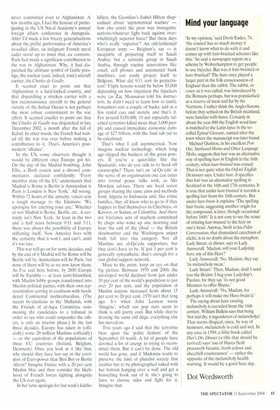Mind your language
In my opinion,' said Doris Eades, 74, 'the council has so much money it doesn't know what to do with it and comes up with hair-brained schemes like this.' So said a newspaper report on a scheme by Wolverhampton to get people to use bicycles. But was it hair-brained or hare-brained? The hare once played a larger part in the folk consciousness of England than the rabbit. The rabbit, or coney as it was called, was introduced by the Romans perhaps, but was popularised as a reserve of meat and fur by the Normans. I rather think the Anglo-Saxons, before they settled on the British mainland, were familiar with hares. Certainly in about the year 800 the English word hare is matched to the Latin lepus in the socalled Epinal Glossary, named after the town where the manuscript was later found.
Michael Quinion, in his excellent Port Out, Starboard Home and Other Language Myths, suggests that hair was an alternative way of spelling hare in English in the 16th century, when hare-brained was coined. That is not quite what the Orford English Dictionaty says. Under hare, it specifies that hair was an alternative spelling in Scotland in the 16th and 17th centuries. It is true that under hare-brained it records a spelling hair from the 16th-century. But under hare-brain it explains: 'The spelling hair-brain, suggesting another origin for the compound, is later, though occasional before 1600.' It is not easy to see the sense of relating hair-brained to the hair on one's head. Anyway, Swift in his Polite Conversation, that dramatised catechism of cliche', is in no doubt about the metaphor: Lady Smart, at dinner, says to Lady Answerall, 'Madam, will your Ladyship have any of this Hare?'
Lady Answerall: 'No. Madam; they say 'tis melancholy meat.'
Lady Smart: 'Then, Madam, shall I send you the Brains: I beg your Ladyship's Pardon, for they say 'tis not good Manners to offer Brains.'
Lady Answerall: 'No, Madam, for perhaps it will make me Hare-brain'd.'
The saying about hare causing melancholy is recorded from the 16th century. William Bullein says that being 'hot and dry, it ingenderers of melancholye'. That seems illogical, since, by way of humours, melancholy is cold and wet. In any case in 1599, a little book called Diet's Dry Dinner (a title that should be revived) says 'use of Hares flesh procureth beautie, fresh colour and cheerfull countenance' — rather the opposite of the melancholy health warning. It would be a good hare day.
Dot Wordsworth










































































 Previous page
Previous page